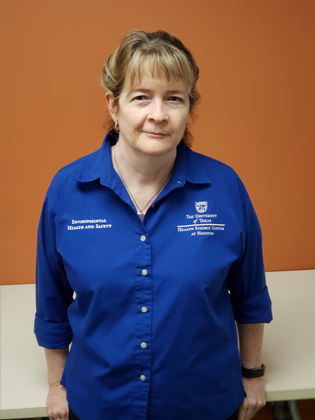The Risk Management and Insurance (RMI) program ensures the presence of systems to minimize the frequency and severity of personnel and property losses. Additionally RMI maintains cost-effective risk financing mechanisms as well as keeps institutional leadership apprised of the levels of risk retention and the costs of risk transfer. RMI’s three product lines are Workers’ Compensation, Property Insurance (real business property and fleet), and Business Continuity Planning.
EHS Main Office 713-500-8100 (answered M-F, 8:00AM-5:00PM CST)
EHS Hotline 713-500-5832 (after hours, weekends, holiday for the on-call safety specialist)
For Emergencies, Dial UT Police Dispatch 713-792-2890 or 911
Submit a Safety ConcernSupervisor's First Report of Injury Form
Workers' Compensation Insurance and Injury Reporting
Workers’ Compensation is a program that provides medical and income benefits to employees injured during the course and scope of employment. UTHealth Houston provides these benefits on behalf of all employees including faculty, staff, and residents. If you or an employee you supervise has an on-the-job injury medical care should be found through the IMO Network unless it’s an emergency. When necessary medical attention is provided please complete the Supervisor's First Report of Injury. Students are covered under their personal insurance, however any injured students must also complete the Supervisor's First Report of Injury. Timely reporting of work-related injuries and illnesses is not only an institutional requirement, but it also helps to ensure appropriate treatment and care is provided (if needed). All accidents and injuries are investigated to understand the root cause and to ensure corrective or preventative actions are put into place to prevent recurrence.
Please select the link below to access the online form
STEPS TO BE TAKEN IN EVENT OF A NEEDLESTICK / BLOODBORNE PATHOGEN EXPOSURE (UT Health Services)
Workers’ Compensation by Classification
- Information for Injured Employees
- Information for Supervisor/Department of an Injured Employee
- Information for Students
Workers' Compensation IMO Med-Select Health Care Network
- WCI Network Acknowledgement Form
- WCI Network Acknowledgement Form (Spanish)
- WCI Notice of Network Requirements
- WCI Notice of Network Requirements (Spanish)
- WCI Network Employee Handbook
- WCI Network Employee Handbook (Spanish)
- WCI IMO Quick Reference Card
- Provider Search and Network Service Areas
- Workers’ Compensation Benefits HealthCare Network FAQ
Workers’ Compensation Forms - Paper versions are for reference only
Please use the electronic form to submit an injury
- Supervisor's First Report Packet (pdf)
- Supervisor's First Report Packet for Students (pdf)
- Prescription Card for UTHealth Houston Employee English & Spanish (pdf)
- Employee's Leave Election form (pdf)
- Request for Paid Leave for Peace Officer (WCI23P) (pdf)
- Employees Rights & Responsibilities (pdf)
- Division of Workers' Compensation Work Status Report (DWC73) (pdf)
Workers' Compensation Links
- Common Workers’ Compensation Definitions
- Frequently Asked Questions (FAQ) for Workers’ Compensation
- Workers’ Compensation Fact Sheets from the Texas Department of Insurance
Workers' Compensation Coverage for Out-of-State or Out-of-Country Employees
Most UT Health Science Center at Houston employees receive Texas-specific Workers' Compensation insurance coverage through the UT System self-administered plan. Health science center faculty or staff stationed out of state or in another country may require coverage under a separate workers' compensation policy since some states or countries do not accept the self-administered plan.
Examples:
Out-of-State Employee
One whose permanent home and work address is located in another state or nation, whether the office is newly set-up or has been in existence for a long time.
An employee hired in Texas for a new office in Washington, D.C., for example, where that person will live.
In-State Employee — One who travels outside of Texas for a limited assignment, but keeps Texas as a home base and intends to return to Texas — even if an out-of-state residence is set up temporarily.
Risk Management and Insurance must be alerted if someone in your department falls within out-of-state or out-of-country categories — as detailed above, so the health science center can provide the correct insurance coverage for our employees. Please contact Sondra Faul, (713) 500-8127, with information about any employees who may fall into an out-of-state or out-of-country category.
Guest, Visitors Incident Form
All Guest/Visitors who need to report an incident taking place on UT Health property should use this form. All Employees/Medical Residents/Student should use the Supervisors’ First Report of Injury.
Travel Requirements for International Locations
All travel requirements are handled through University Travel.
Please follow this link for International Travel Information. https://inside.uth.edu/travel/international/guide-to-international-travel-requirements.htm
Please follow this link for other types of travel. https://inside.uth.edu/travel/index.htm
Special Events Insurance
For Special Events Insurance contact RMI at 713-500-8133 or 713-500-8100
[email protected]
Healthcare Credentialing
All healthcare credentialing requests should be sent to [email protected]. For questions, please call Catherine Thompson, Healthcare Risk Manager at (713) 500-3281 [direct] or (713) 500-3268 [main].
Property Insurance
UTHealth Houston’s property insurance program is administered by UT System and managed at UTHealth Houston by Risk Management and Insurance. The Comprehensive Property Protection Program (CPPP) is constructed of two “towers”, Fire and All other Perils (AOP) and Wind and Flood (W&F). All UTHealth Houston property is insured but under the CPPP it has an associated $500,000 per occurrence deductible. Most losses experienced at UTHealth Houston are below the $500,000 per occurrence deductible. UTHealth Houston offers additional property insurance, equipment floater, that effectively “buys down” the deductible.
The vast majority of UTHealth Houston’s losses are “retained losses.” These are losses that are below the $500,000 deductible. What are the three most common retained loss perils (Word document).
Equipment Floater Policies
It is possible to “buy down” the UTHealth Houston deductible of $500,000 per occurrence by purchasing additional insurance. This additional insurance can be purchase for $1.00 per $100 of insured value. For example if a laboratory purchased a microscope for $5,000 and insured the microscope under the equipment floater policy the premium would be $50 per year. Once the premium is paid and a covered loss occurs, depending on the equipment, the per occurrence deductible is between $1500 and $2500.
The financial decision to purchase additional insurance for certain types of equipment is based on a financial recovery formula, that suggests the purchase of additional insurance if the total value of the asset after purchasing five years’ worth of premium and the associated deductible is greater than 70% of the assets original value. Although depreciation, revenue created by the asset, loss frequency and severity, and inflation should also be considered when purchasing additional coverage, this formula provides a quick snapshot of asset valuation versus premium and deductible cost.
The financial recovery formula is:
![]()
Property FAQ
- Who do I report a loss to?
- Risk Management and Insurance would be the best place to report any losses to. However, RMI may by only one of many agencies and departments involved in a loss, depending on frequency and severity.
- What is a “peril”?
- A peril is something that could cause a loss. Examples include fire, flood, and named windstorm.
- What is the deductible?
- A deductible is a portion of the loss that is retained by the insured. The insured is UTHealth Houston and the deductible for property is $500,000. If a loss occurs the deductible may be the responsibility of the affected department.
- What is a retained loss?
- A retained loss is a loss that is less than the UTHealth Houston deductible $500,000.
Fleet and Miscellaneous Insurance
Fleet insurance includes two types of coverages physical damage and liability. Liability provides basic coverage for UTHealth Houston vehicles and meets the State of Texas minimum vehicle insurance requirements. Liability insurance is required on all UTHealth Houston vehicles. Comprehensive coverage is an elective coverage, required for leased vehicles, for new vehicles and provides “full coverage” for most losses that could be experienced by a UTHealth Houston vehicle. RMI also manages other insurance programs such as Fine Arts and Endowment.
Fleet Management
UTHealth Houston’s fleet is comprised of vehicles that are owned by UTHealth, leased, rented, or owned by employees’ and used for UTHealth Houston business. Each type of ownership within UTHealth’s fleet operation may require distinct risk financing programs to mitigate All operators of UTHealth Houston vehicles are required to complete a UTHealth Houston Mileage log (Word Doc). Each operator should return the UTHealth Houston Mileage log to RMI monthly. The UTHealth Houston Mileage log reporting is a state requirement and is auditable by various state agencies.
Fleet Management Forms
Insurance Coverage
ESRP for Vehicle Accidents (Word document)
UTHealth Houston Mileage log (Word doc)
Guidelines for Driving UTHealth Houston Vehicles (PDF) HOOP 205 Policy
Fleet FAQ
- How do I become a UTHealth Houston driver?
- How do I purchase fleet insurance?
- Contact RMI for purchase of insurance.
- Where do I turn in UTHealth Houston Mileage log?
- Send all Vehicle Use Report Log to OCB 1.330.
- What happens if I get in an accident?
- ESRP for Vehicle Accidents (Word document)
RMI Staff
 |
Bryan Evans, MBA, ARM, MAC B.S. Hotel & Restaurant Management, University of Houston |
 |
Sondra Faul, NPC, CIC, ARM Sr. Claims & Insurance Analyst Licensed TX WC Adjuster [email protected] (713) 500-8127 OCB 1.330 H CIC, Certified Insurance Counselor BS, Interdisciplinary Studies, University of Houston-Downtown |